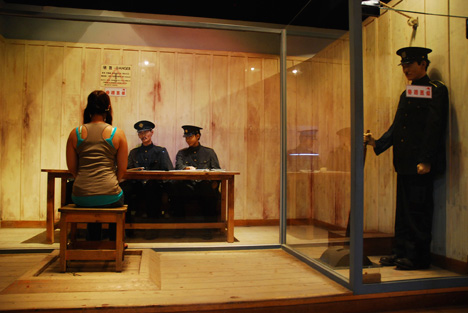Seodaemun Prison History Hall is a museum and former prison
in Seodaemun-gu, Seoul, South Korea. It was constructed beginning in 1907. The
prison was opened on October 21, 1908, under the name Gyeongseong Gamok by
occupying Japanese forces in an attempt to impose order on the newly acquired
territory. Prior, the country had a virtually non-existent penal system, and
the introduction of Seodaemun Prison was a precursor to full out occupation.
Its name was changed to Seodaemun Prison in 1923.
Seodaemun became a bastion for the Korean independence
movement from its opening in 1908 until the liberation of the country in 1945.
As the Japanese arrested more patriots, the prison's notoriety increased and it
eventually became a symbol of perseverance. Many patriots died in custody, were
tortured to death, or were executed within the prison's walls. The macabre
execution hall still stands, housing the prison's gallows (with a tunnel nearby
to dispose of corpses).
Throughout the preserved prison-turned-museum, you can see
chillingly recreated torture chambers, jail cells, isolation cells, and more.
The women's section has been preserved, basement cells in which no privacy was
afforded. Some of the torture chambers have frighteningly realistic mannequins
and effigies to famous Korean patriots who died within the prison.
Designated as a historic site in 1988 and renovated in 1995,
Seodaemun is an interesting place to visit for those who want a tactile
experience of the Japanese occupation and the horrors entailed. It stands out
amongst Seoul's other historic sites as a monument to those who helped shape
the modern Korean nation.
Opening Hours: March – October (9.30 am - 6 pm)
November –
February (9.30 am - 5 pm)
Closed:
Mondays, January 1, Lunar New Year, and Harvest Moon Festival
(Chuseok).
Admission Fees: Adults
: 1,500 won
Youths : 1,000 won
Children : 500
won










No comments:
Post a Comment